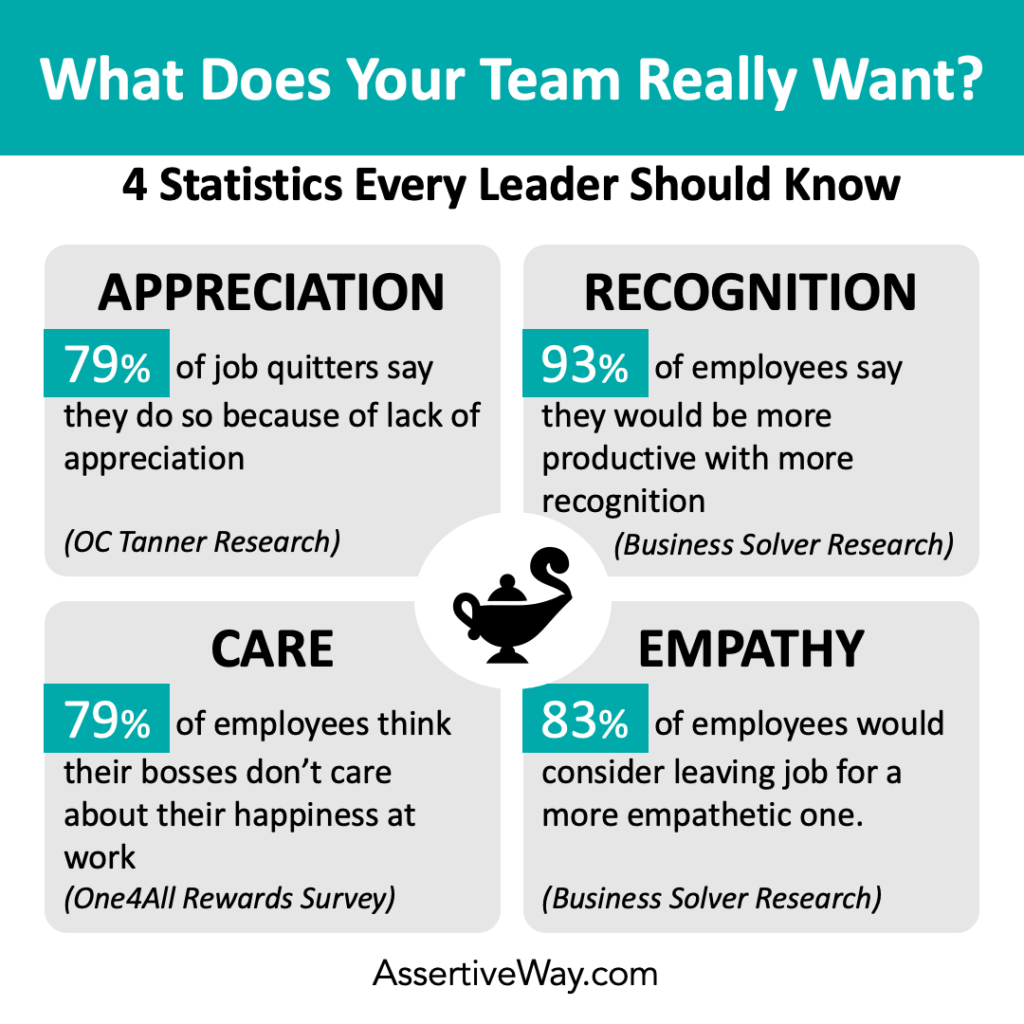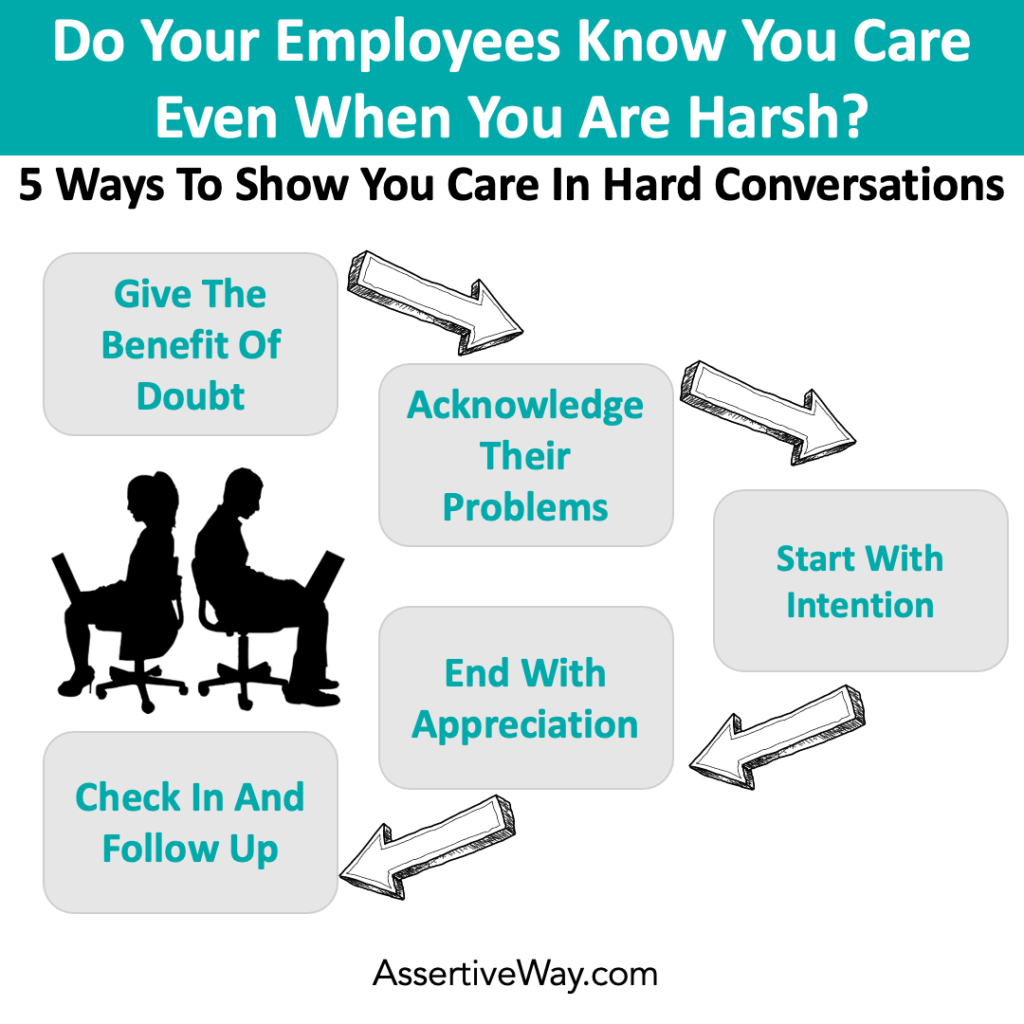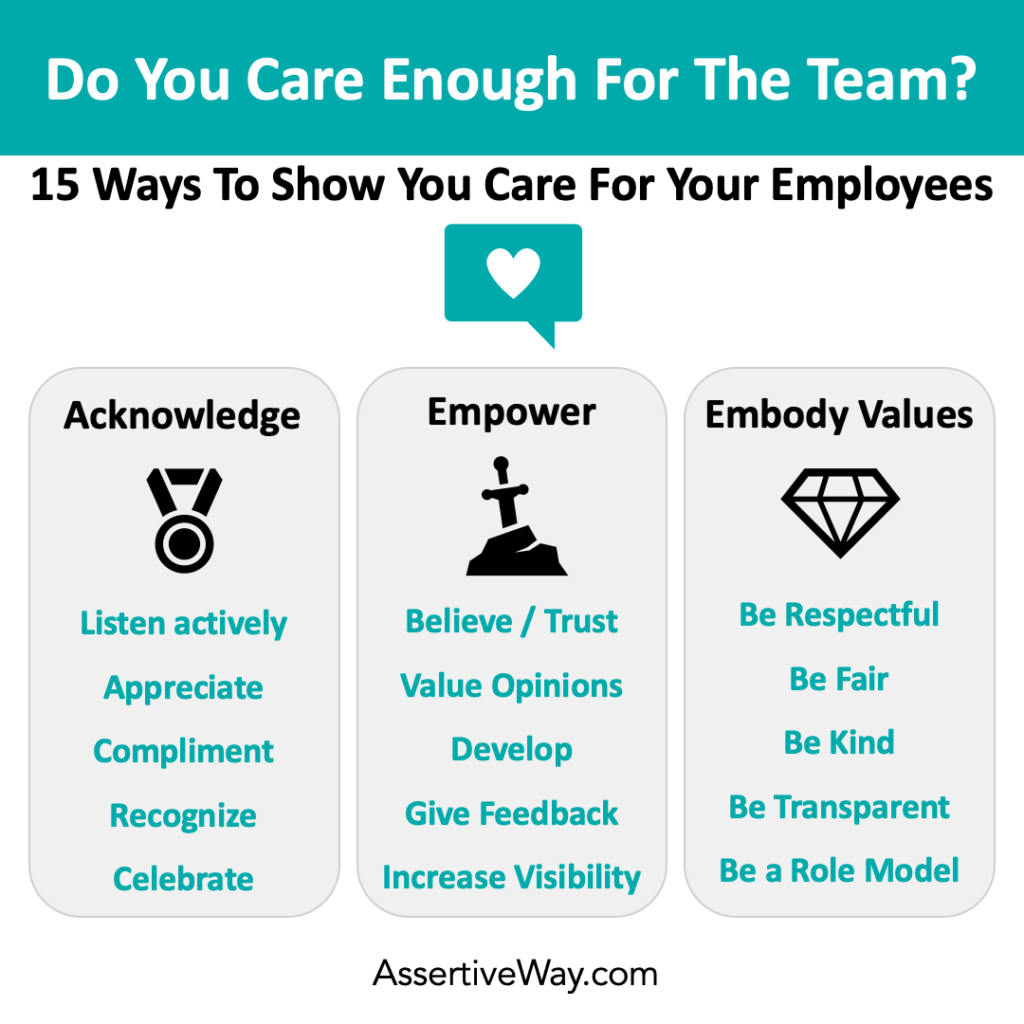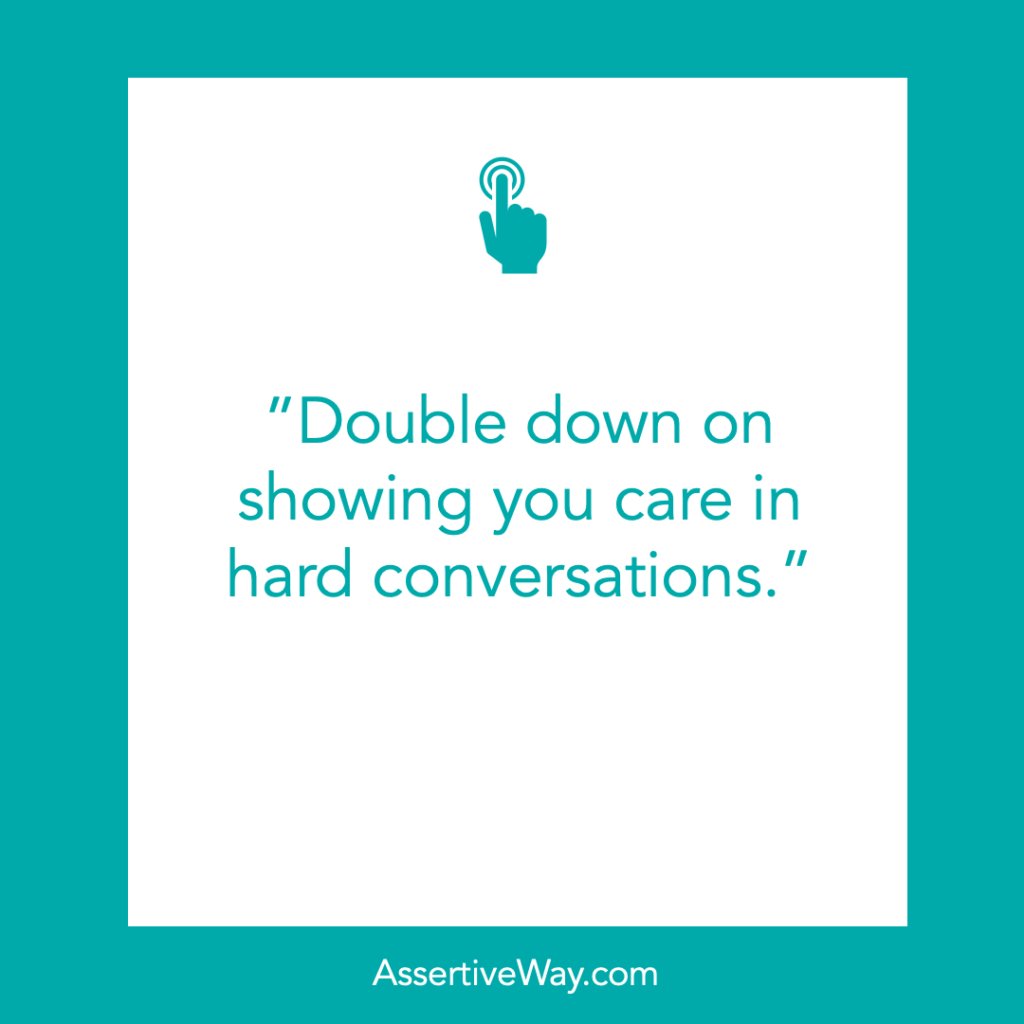15 simple ways to show you value your employees.
By Assertive Way
Key Takeaways
- Effective leaders understand the power of showing they value and care about their team.
- When you demonstrate you value your people, they are more likely to show they value their people, and so on, creating a positive domino effect in the workplace.
- Employees leave bosses who don't appreciate, recognize, or empathize with them.
- You can care AND have hard conversations, by giving the benefit of doubt, acknowledging others, starting with intention, ending with appreciation, and checking in / following up.
- 3 core ways to show you care are to acknowledge, empower, and embody positive values.
- Show you care with the following 15 actions: appreciate, recognize, compliment, listen, celebrate, believe / trust, develop them, give honest feedback, value their opinions, increase their visibility, respect, be transparent, be kind, be fair, and be a role model.
Why You Need To Show You Care For Your Team
True leaders care!
What you see leaders do on Netflix, TV shows, political news is not caring and is not assertive.
According to an HBR article, the top factor for leaders to establish trust is positive relationships, which also means showing concern and care for others.
You don’t need to host fancy parties and give out gifts to make your team feel cared for. You don’t need even to give them a raise, bonus, or promotion. Do you know what your team members really want? To feel heard, appreciated, and valued. To feel like you have an interest in them.
Do you know what is the most powerful way of doing that? Have quality in every interaction you have with them. Be attentive to their needs, understand their perspective, believe in them, respect them, and be specific about how you value them.
We believe in being confident, candid, and caring in every interaction as a leader or employee. Caring enables leaders to be more effective when they are candid, when they want to motivate the team, and when they have hard conversations.
Don’t fake you care, mean it, even if you just demonstrate respect which is the absolute minimum you should be doing as a leader.
True leaders care.

Start the domino effect of workplace care
A senior manager in a global multinational working in the UK, I’ll call her Tracy, got emotional when she told me the happiest moment in her career. The CEO of her company, who was many levels above her, saw her and spontaneously called her into his office when he had 5 min to spare, and said:
“Tracy, I’m hearing wonderful things about you. Congratulations! You have a brilliant future ahead of you.”
This unexpected simple comment made Tracy feel extremely happy, acknowledged, and recognized. The CEO believed in her and she wanted to continue to live up to his conviction in her work.
In that moment she decided she was always going to show her employees appreciation because she realized how powerful it was. And she did. Her team will learn the values of caring and showing appreciation through her example. And this chain of leadership thoughtfulness will continue and humanize work experiences for generations to come.
Start a workplace care domino effect through your actions!
Start a workplace care domino effect.
Do you put enough effort to show that you care for your team?
I’ve witnessed employees leave their company in tears, after serving at a high level for several years, because they felt the leaders didn’t recognize their work.
Even when upper management had practices to publicly acknowledge the contribution of those leaving the company, if they failed to adequately explain the contributions of an employee or say their name incorrectly, the departing employee and the other team members would feel devalued.
Employees quit their managers, not their jobs. People want to be seen, validated, and appreciated.

Statistics every leader should know
Here’s some statistics you must know:
- Appreciation – 79% of people who quit their jobs do so because of lack of appreciation according to OC Tanner Research. Usually the appreciation gap is from their line manager. People want appreciation and recognition more than anything else.
- Care – 79% of employees believe their bosses don’t care about their happiness at work, according to One4All Rewards 2018 Happiness Survey.
- Recognition – 93% of employees say that when their employer recognizes their accomplishments, it increases their productivity according to business solver research.
- Empathy – 74% of employees said they would work longer hours for an empathetic employer and 83% would consider leaving their current organization for a similar role at a more empathetic organization according to business solver research.
It’s not too much to ask for. Employees work 40 hours or more on the leader’s vision and priorities. All they want is to feel valued and respected. Paying a team member a salary doesn’t justify neglecting their emotional well-being.
Not only that, happy employees are more engaged, productive, and loyal. Show commitment to your people. Help build their confidence.
How can you find out if your employees feel like you care for them? Examine your engagement scores, employee turnover, how motivated they are, and how open they are to constructive criticism.
Paying a team member a salary doesn’t justify neglecting their emotional well-being.

Show You Care In Hard Conversations
Showing you care doesn’t mean avoiding hard conversations. Instead, show you care during hard conversations When people feel like hard conversation comes from a place of respect, consideration, and desire to serve, they are more likely to listen and to change as a result.
In hard conversation show you care by doing these 5 things.
Give the benefit of doubt
Give your people the opportunity to explain their perspective or reason. Don’t every assume they are lazy, unprofessional, or uncapable. There could be hundreds of reasons that explain a behavior that you don’t like. Give them the chance to give you further insight. That way, you’ll know what to say and how to better support them.
Acknowledge their problems
Everyone has different skillsets. While something may be easy to you, it may be hard for others. Acknowledge your team’s problems even if you don’t understand it at first. Acknowledge by listening to what they have to say, rephrasing it, and showing that you hear the struggle. For example, “I hear you, you are feeling overwhelmed and don’t understand the importance of this work, is that right?”
Start with intention
Before the truly listen to your message, people need to know your intention. Explain your positive intention for them, for the customer, or for the team before giving negative feedback, before saying no to a request, and before sharing bad news. For example, you could say “I want you to be successful and respected by the rest of the team.”
End with appreciation
After a hard conversation, show you care about them once again. Appreciate their work so far, their willingness to collaborate, or their commitment to change behavior. Don’t take your employees or their efforts for granted even if you don’t like their attitude or behavior. Treat them with absolute respect and consideration, give them the opportunity to change, and then make the right decision even if it’s not popular.
Check in and follow up
Once you learn about someone’s struggles or after you ask them for something, make sure you check in and follow up regularly. The goal is not to evaluate and judge them, but to make sure they have the support they need to be successful along the way.

3 Elements Of Care At Work
As a leader, there are three elements to show care that you should be thinking about.
Acknowledge your people
This is about valuing the past. People want to feel validated and hear. They resent feeling invisible by their leaders. They want to be noticed, valued, and recognized for what they do, say, and who they are.
Empower your people
This is about giving employees the confidence to move forward. When you empower your team, you give them agency, and they take more risks. They accelerate their learning curve and feel more motivated.
Embody high values and integrity
This is about how you show up in the present as a leader. As a leader, your people look up to you for cues on how to think and behave. As a leader, people notice what values you espouse. As a leader, people expect consistency between what you say and what you do. Therefore, you need to consider what values you will champion in your team and stand by them.
Here are 15 ways you acknowledge your people, empower your people, and embody high values and integrity without monetary incentives.
Let’s break it down!

Acknowledge Your People
1 Listen Actively
Have an open door policy. Invite your team to share their wants, needs, and struggles, and then listen to them with honest interest. Ask them how you can be a better leader for them. Understand how each person likes to be appreciated and acknowledged. Send anonymous surveys out to capture more insight about your team’s feelings and desires, and then have an honest conversation with the team about it.
When I started to invite feedback from my team, I learned they were feeling burned out and that I wasn’t giving them enough direction. I learned I wasn’t being sufficiently selective in the work that came to our team. Because I was willing to listen to them, I was able to improve team morale.
2 Appreciate
Give your team members credit for the work they’ve done. Publicly thank them for their contribution, and share thank you notes and small gifts. Appreciate the entire team by taking them out for a celebration lunch. Learn to appreciate in a powerful way by being specific and highlighting the impact of their work.
3 Compliment
Compliment and praise your people often. You can give positive feedback n good work, impactful contribution, progress, or attitude. Also remember to be specific. Public praise is effective too. Compliments, appreciation, and recognition go hand in hand and you can deliver them individually or together.
One of bosses complimented my work and my work ethics so often that it made me believe in myself and it motivated me to work 12 to 13 hours a day when others worked 8 hours a day.
4 Recognize
Recognition is key. You can recognize quality of work, accomplishments, talent, progress, attitude such as helping other people, and contribution of employees leaving. There are several non-salary or bonus related ways to recognize people. You could do it verbally with compliments and appreciation, small gifts, awards, your time, educational or project opportunities, and so on. Recognition is strongest when paired with a compliment and appreciation.
For example, one of my university professors organized a 5-course gourmet dinner at his home with his family for the top 2 students in his class. It was a memorable recognition.
5 Celebrate
Celebration creates a sense of team unity and community especially when done together with the team. Celebrate accomplishments, progress, work anniversaries, and even personal life events (birthdays, weddings, babies). A simple cake, pizza, and handwritten card can create the atmosphere of celebration.
One of my university professors organized a 5-course gourmet dinner at his home with his family for the top 2 students in his class. It was a memorable recognition.

Empower Your People
6 Believe and trust
Believe in your team members more then they believe in themselves. Say you believe in them, challenge them with stretch assignments, support them in achieving it, and back them up when things go wrong. Demonstrate trust by giving them autonomy.
7 Value their opinion
Ask them what they think about problems, share their perspective with others, and make them feel heard. This requires you to have some humility, even as the boss. When you show you value what your team have to say, they will speak up and share more. If they summon the courage to speak up and feel ignored, they are less likely to speak up and share their views again.
8 Develop
When you care about an employee, you help them learn new skills and abilities. Engage with each team member to create a development plan with training, coaching, mentoring, or strategic exposure to opportunities hat help them grow. This way, you intentionally add value to that person.
9 Give honest feedback
Sharing constructive feedback with empathy and kindness can motivate and empower team members. Avoiding tough conversations doesn’t help them. The secret here is to do have respect and consideration when you deliver difficult feedback.
10 Increase their visibility
Push your employees outside of their comfort zone by exposing them to greater opportunities and to other teams and leaders, even if it increases the chances that they leave your team.
More senior leaders in the organization gave me the feedback that my team and their work weren’t visible enough. As their manager, I began to continuously encourage them to show up in multi-stakeholder meetings, interact with other leaders in the organization, and speak or present ideas.
More senior leaders in the organization gave me the feedback that my team and their work weren’t visible enough. Because of that, they couldn’t get good performance evaluations and raises.

Embody High Values And Integrity
11 Be respectful
Respect your team members personally and respect their work. This doesn’t mean you have to admire them. It means treating them with dignity and having regards for their feelings and situation. An example of respecting them as individuals is to honor the one on one meetings and performance meetings with them and to not surprise them with negative evaluations without giving them a chance to change. An example of respecting their work is to not ask them to engage in a task if it won’t be used.
12 Be fair
While it is difficult to not have biases in all actions and decision, strive to at least treat employees fairly. For example, give them an opportunity to defend themselves, apply for new openings, and speak up without retaliation. Avoid judgement by engaging in dialogue to understand the context of a negative situation from their perspective.
13 Be kind
Kindness goes beyond not shouting, harassing, or being condescending. Have courtesy and treat people with dignity. Give employees the benefit of doubt by asking them questions and avoiding accusations. Assume they have positive intention and problem solve with them rather than for them.
14 Be transparent
Transparency goes hand in hand with fairness and respect. If you have bad news to deliver like layoffs, pay cuts, or relocation, communicate as early as you can to give employees an opportunity to prepare in advance.
15 Be a role model
Exemplify what you preach and model the desired behavior. That way your team will respect you and will be more likely to listen to what you have to say.
Respect your team members personally and respect their work. This doesn’t mean you have to admire them. It means treating them with dignity and having regards for their feelings and situation.
Conclusion
These ways of showing care to your team members don’t take a lot of time once they are internalized and transformed into everyday leadership habits. They are not a performance short term diet. They are meant to be a long-term workstyle.
Caring for your beam will enhance team unity, motivation, and productivity. They will increase engagement and reduce churn. And they will make work more joyful, fulfilling, and meaningful for everyone.
Recap
Caring is not show and tell. It’s most meaningful when it is tailed to each person.
When you demonstrate care for your team, you start the domino effect of workplace care because they will learn and model care with their teams in the future.
And remember, caring about your people doesn’t mean avoiding hard conversations. When you have tough conversations, show you care by doing this:
- Give the benefit of doubt
- Acknowledge their problems
- Start with intention
- End with appreciation
- Check in and follow up
As a leader, here are three elements to show care that you should be thinking about.
- Acknowledge your people – Listen actively, appreciate, compliment, recognize, celebrate
- Empower your people – Believe and trust, value their opinion, develop, give honest feedback, Increase visibility
- Embody high values and integrity – Be respectful, fair, kind, transparent, be a role model
“Bad leaders care about who is right. Good leaders care about what is right.” – Simon Sinek
Spread the assertive confidence!







How do you show you care about others at work?
Thanks for the efforts, hoping justice will be served. I am curious as to what assets is left for shareholders. Thanks again. Lenore Gay Zenas
Muchos Gracias for your post. Thanks Again. Fantastic. Wandie Ambros Frangos
Your welcome! Thank you for your comment! Made my day. Very simpatico of you! 😊
I like your writing style genuinely enjoying this site. Kit Svend Lenci
Thanks I really appreciate your kind words!